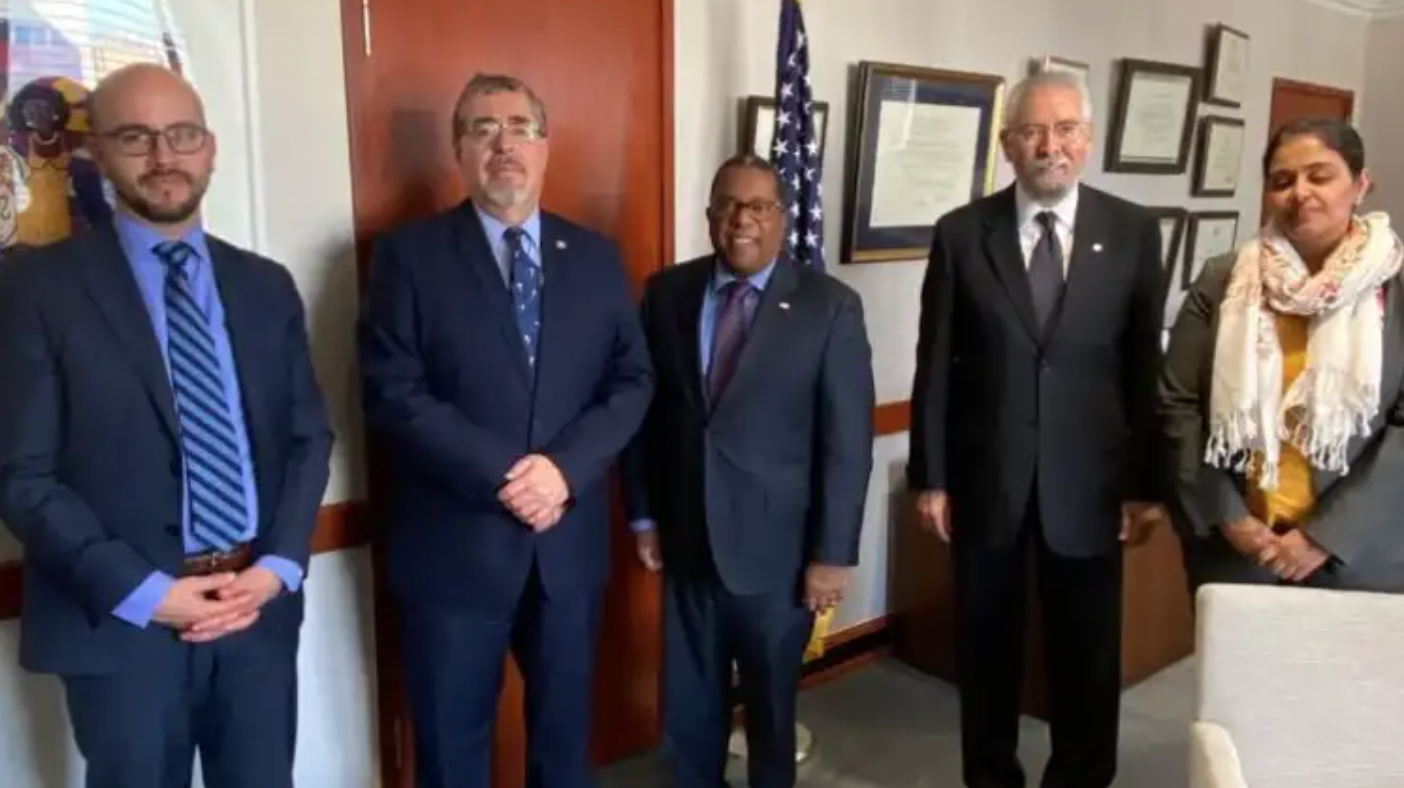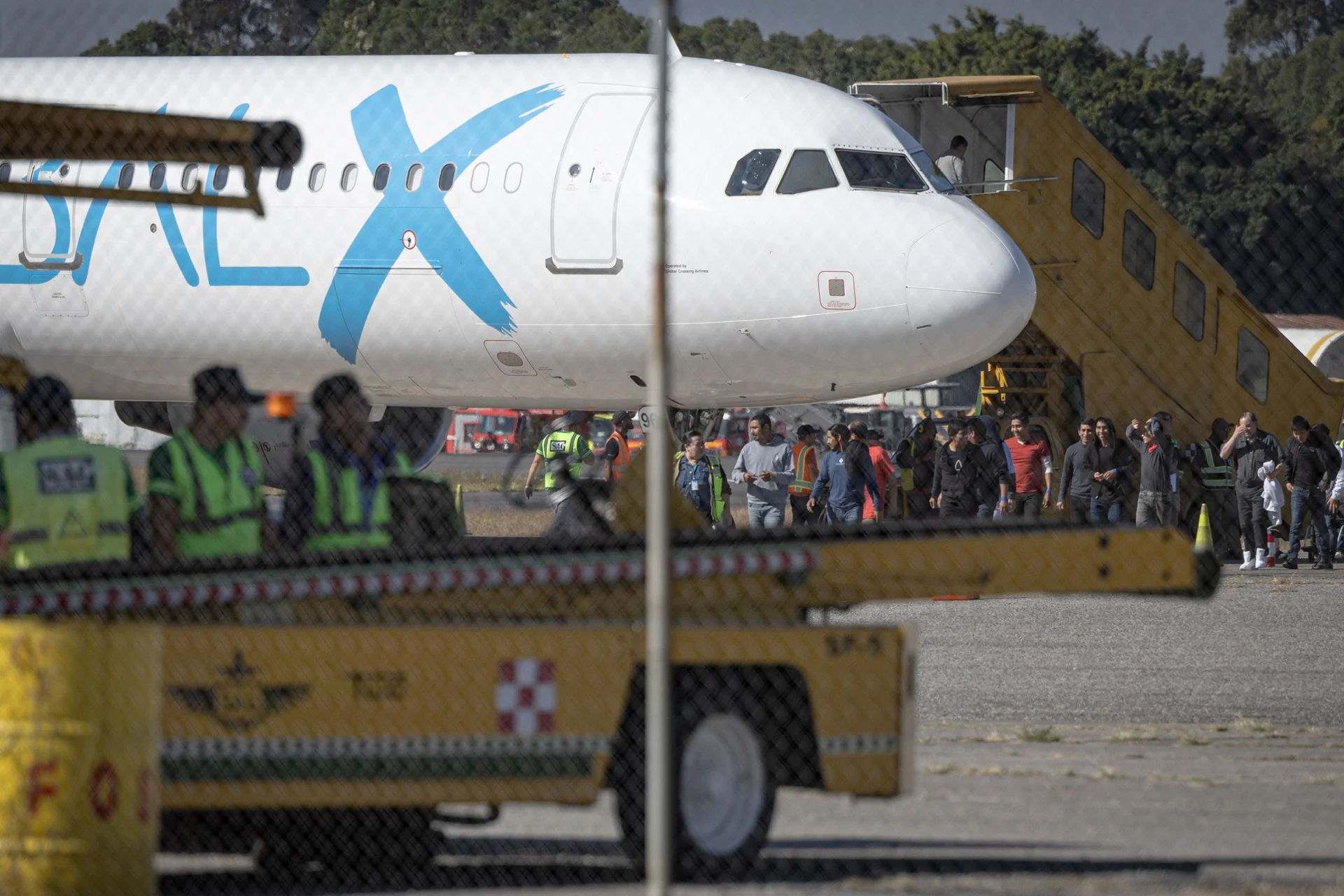Central America
U.S. residents ask Arevalo for consular improvements

November 12 |
President-elect, Bernardo Arévalo, held a two-day tour of Washington, United States, where he met with different sectors and U.S. officials and migrant organizations.
Improving consular services, maximizing remittances through banks and promoting electoral civic participation were some of the topics discussed of interest to the Guatemalan community in the United States. Between 25 and 30 leaders and representatives of migrant associations from Washington, Texas, New York, New Jersey, North Carolina, among others, participated.
The president-elect was accompanied on the tour by Francisco Villagrán, Guatemala’s former ambassador to various international organizations. The three issues were put on the table, but there was no in-depth discussion on how they will be addressed by the Executive Branch during the next four years.
With respect to consular attention, according to Ben Monterroso, migrant leader, it was stated that the processing of passports at the consulates should be improved. He expressed that there is difficulty in scheduling appointments, there are no passport booklets or it takes several weeks to process them. This document is necessary to carry out procedures in the North American country, even to obtain a driver’s license in some states.
“We talked about the consulates, we are clear that we have to improve both the service and the documents, because we continue with the same pending as always, that there are no passport books, no passports or no appointments”, he indicated.
As a second point, the representatives expressed to Arevalo the interest in a way that remittances can be collected in Guatemala in a proper way. In that sense, it was said that these will be maximized through two banks, however at the moment it is not known which ones they will be.
Although there is no clarity on specific actions to comply with the request, Monterroso explained that this is necessary so that Guatemalan families can take advantage of them in a better way.
“To make sure that there is transparency in collections, all those kinds of things and to see how remittances can be maximized, not many details were discussed,” he said.
The third topic was to support the civic participation of Guatemalans abroad. Monterroso pointed out that they are aware that this function does not correspond to the Presidency, but he can lead an improvement in this sense.
“It is not entirely up to him, but he can be a leader and make sure that what the Ministry of Foreign Affairs is responsible for is done in an appropriate manner,” Monterroso said.
In addition, he pointed out that it was made clear that they want to have more recognition, not only as Guatemalans abroad but as the different indigenous communities to which they belong,
“That it be recognized that Guatemala is no longer only in the 22 departments, we have a department called the United States,” he emphasized.
In the opinion of the migrants, they should receive special treatment like other groups that are benefited in the country.
The communication team of the elected government was asked for an opinion on the meeting, but did not respond.
Central America
UN complaint filed against Costa Rica over detention of migrant children

A group of human rights lawyers has filed a complaint against Costa Rica, alleging that the Central American nation violated the rights of dozens of migrant children by detaining them in a rural facility for nearly two months after they were deported from the United States in February.
The children — some as young as 2 years old — are part of a larger group of migrants, mainly from Afghanistan, China, Russia, and other Asian countries, who were deported from the U.S. as part of a broader immigration crackdown under former President Donald Trump.
Many had hoped to seek asylum in the U.S. and expressed fear about returning to their home countries. Instead, they were dropped off in Costa Rica and Panama, where they do not speak the local language. Originally intended as brief transit points, these countries have become a state of limbo, with migrants stuck for over 50 days.
Critics argue this is part of a U.S. strategy to “export” its deportation process, while human rights advocates warn that Costa Rica and Panama are becoming a “black hole” for deported migrants.
In Costa Rica, around 200 migrants — including 81 children — were taken to a rural migrant processing center near the border with Panama and held in a building that once served as a factory.
The complaint, filed Thursday night by the Global Strategic Litigation Council (GSLC) and other human rights groups, was submitted to the UN Committee on the Rights of the Child, alleging that Costa Rica breached international agreements under the Convention on the Rights of the Child.
Silvia Serna Román, one of the attorneys involved, said the migrants were detained without legal status and had no access to education or mental health services in their native languages. The prolonged detention is raising concerns about long-term psychological effects on the children, as many parents report signs of emotional distress such as isolation and sadness.
“These children are in a very crucial stage of development, and they’ve already fled difficult conditions in their home countries,” Serna Román said on Friday. “Now, they’re being subjected to prolonged detention and inhumane treatment. Parents are worried.”
Serna Román also said the migrants have had little access to legal counsel. The Costa Rican government has stated that detainees can leave the facility if they agree to return to their countries of origin or apply for asylum in Costa Rica.
Central America
Nicaraguan Exiles to Mark 7th Anniversary of 2018 Protests with Global Commemorations

The Nicaraguan opposition in exile announced on Thursday that it will commemorate the seventh anniversary of the April 2018 protests against the government of President Daniel Ortega and his wife, Rosario Murillo, with events in Costa Rica, the United States, and several European countries.
The commemorative activities—which will call for justice for the victims, as well as freedom and democracy for Nicaragua—will include religious services, public forums, cultural fairs, and other public gatherings, according to official announcements.
In April 2018, thousands of Nicaraguans took to the streets to protest controversial reforms to the social security system. The government’s violent response quickly turned the demonstrations into a broader call for the resignation of President Ortega, who is now 79 and has been in power since 2007.
The protests resulted in at least 355 deaths, according to the Inter-American Commission on Human Rights (IACHR), although Nicaraguan organizations claim the toll is as high as 684. Ortega has acknowledged “more than 300” deaths and maintains the unrest was an attempted coup d’état.
International
Arsenal stun Real Madrid at the Bernabéu to reach Champions League semifinals

Arsenal enjoyed a “historic night” on Wednesday after defeating Real Madrid 2-1 at the Santiago Bernabéu, knocking them out of the Champions League quarterfinals, midfielder Declan Rice said.
“It’s such a special night for this club, a historic night for this club,” said Rice, who scored twice in the first leg in London, speaking to TNT Sports.
The English international was named Man of the Match in both legs — the 3-0 win in London and the second leg in Madrid.
“It’s amazing. I knew we were on an upward trajectory and we’ve done incredibly well in this competition. We deserve it and we have full confidence in our coach. Reaching the semifinals is unbelievable,” Rice added.
-

 Central America5 days ago
Central America5 days agoPetro questions Ecuador’s vote, cites reports of military control and arrests
-

 International4 days ago
International4 days agoArsenal stun Real Madrid at the Bernabéu to reach Champions League semifinals
-

 International3 days ago
International3 days agoDominican ‘False Hero’ Arrested for Faking Role in Nightclub Collapse That Killed 231
-

 Central America3 days ago
Central America3 days agoNicaraguan Exiles to Mark 7th Anniversary of 2018 Protests with Global Commemorations
-

 International4 days ago
International4 days agoBogotá residents line up for yellow fever vaccine amid national alert
-

 International4 days ago
International4 days agoDeSantis’ immigration crackdown sparks alarm in Venezuelan Communities in Doral
-

 International2 days ago
International2 days agoACLU seeks emergency court order to stop venezuelan deportations under Wartime Law
-

 Central America2 days ago
Central America2 days agoUN complaint filed against Costa Rica over detention of migrant children
-

 International4 days ago
International4 days agoMexico refuses to restore ties with Ecuador while Noboa remains in office
-

 International11 hours ago
International11 hours agoThousands rally nationwide against Trump’s threat to U.S. democracy
-

 International5 days ago
International5 days agoColombia: Search continues for missing limb of italian scientist found dismembered



























































































